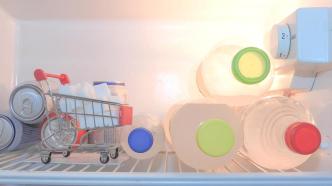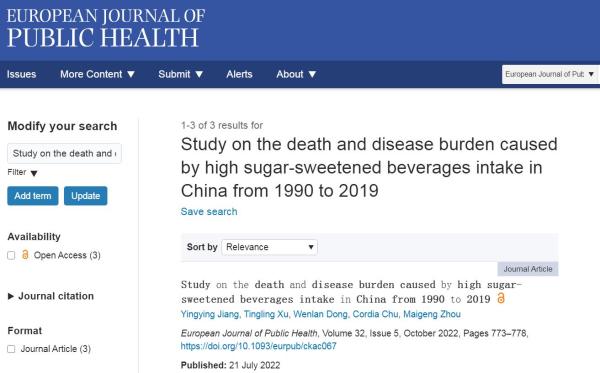
Expert interviewed: Guo Xiaohui, chief physician of the Department of Endocrinology, Peking University First Hospital
Zhou Maigeng of the Chinese Center for Disease Control and Prevention recently published a paper in the latest issue of the European Journal of Public Health, saying that in the past 30 years, the number of deaths among Chinese residents due to excessive intake of sugar-sweetened beverages has almost doubled. Excessive intake of sugar-sweetened beverages Beverage-related mortality also increased by 35 percent.

Deaths from sugar-sweetened beverages in China reached 46,600 in 2019, a 95% increase from 1990
The researchers analyzed the death cases and disease burden caused by the consumption of high-sugar sweetened beverages in my country and various provinces from 1990 to 2019. Data show that in 2019, the number of deaths caused by sugar-sweetened beverages in China reached 46,600, an increase of 95% compared with 1990, while the global growth rate was 30.4%. The mortality rate caused by excessive intake of sugar-sweetened beverages in my country increased from 0.34% in 1990 to 0.46% in 2019, an increase of 35%.
The above study found that in 2014, the per capita annual beverage intake of Chinese people was as high as 119 kg, about 10 times the per capita consumption in 2003. In terms of gender, the number of deaths from sugar-sweetened beverages in Chinese men in 2019 and the increase in deaths over the past 30 years were higher than those of women. Geographically, in 2019, residents in Shandong, Henan, Hebei, Hunan and Guangdong provinces had a higher burden of death due to excessive intake of sugar-sweetened beverages.
Studies have shown that excessive consumption of sugar-sweetened beverages causes a disproportionate burden of death from cardiovascular disease and diabetes. Over the past 30 years, deaths from ischemic heart disease and diabetes have increased by 95% and 94%, respectively. In 2019, there were 42,098 deaths from ischemic heart disease and 4,534 deaths from diabetes. Compared with 1990, disability-adjusted life years (DALYs) for ischaemic heart disease and diabetes due to high-sugar beverage consumption increased by 49% and 88%, respectively, in 2019.
Excessive consumption of sugar-sweetened beverages as a behavioral risk factor, along with high body mass index, high blood pressure, excessive red meat intake, alcohol consumption and smoking, has become increasingly social and economical, the researchers noted. Generally, it has become an "invisible killer" that threatens people's health.
Guo Xiaohui, chief physician of the Department of Endocrinology at Peking University First Hospital, said in an interview with a reporter from the Global Times Client that according to the "Dietary Guidelines for Chinese Residents (2022 Edition)", the daily intake of sugar for adults should not exceed 50 grams. Controlled below 25 grams. Sugar-sweetened beverages taste good, and most people like to drink them. For example, a 330ml can of cola contains 35 grams of sugar, and there are many sweet drinks that do not label the sugar content and content. Over time, eating too much sugar will cause great harm to your health.
Excessive sugar intake can lead to obesity, impaired insulin sensitivity, and increased risk of type 2 diabetes. Excessive intake of sugar-sweetened beverages can also cause abnormal blood lipid metabolism and lead to hyperuricemia, which are high risk factors for cardiovascular disease. Guo Xiaohui said: "Young people have good blood vessels, but many people like to drink a lot of sweet drinks, which are prone to increase in triglyceride and low-density lipoprotein cholesterol, and the formation of plaque in the blood vessel wall, causing atherosclerosis and cardiovascular disease. An important cause of disease, with the greatest potential harm to health.”
At the same time, excessive intake of sugar-sweetened beverages may also increase the risk of cancer. The British Medical Journal has written that drinking 100ml of sugar-sweetened beverages a day increases the risk of cancer by 18%, and women who drink one cup (355ml) or more of sugar-sweetened beverages a day have a 78% increased risk of liver cancer.
It is a human instinct to like sweets. Sweets not only replenish energy, but also activate dopamine neurons in the brain, making people feel happy and craving more sugar. The study shows that consuming sugar-sweetened beverages is as easy to become addicted as smoking and drinking alcohol. The continuous growth of global sales of sugar-sweetened beverages has also led to an increase in the consumption of sugar-sweetened beverages in developing countries such as my country. According to data from the National Bureau of Statistics, the sales volume of beverages in my country increased from 97.91 million tons in 2010 to 171.65 million tons in 2019. "China Consumer News" reported that more than half of consumers in my country buy carbonated beverages 1-2 times a week, and nearly a quarter of consumers buy 3-4 times a week.
How to help you control your intake of sugar-sweetened beverages? Guo Xiaohui said that for the majority of consumers, it is best to drink less or no sugar-sweetened beverages, and replace them with healthy beverages such as water, sugar-free coffee, and tea. In terms of industry management, my country's sugar control work should take comprehensive measures, including food nutrition labels that clearly indicate the type and content of various sugars, such as sucrose, glucose, or fructose, and how many grams it contains, not just vague in the ingredient list callout. The ingredients and content of sweeteners in sugar-free beverages should also be clearly marked. The authors of the study described in the article also recommend the need to improve sugar-sweetened food processing techniques, manage the sugar-sweetened beverage market through taxes or subsidies, increase the availability of water and healthy foods, limit the promotion of sugar-sweetened beverages and advertising to children and adolescents, and promote public health. Health education and healthy eating advice.
(Original title "How harmful is a cup of sweet drink? Chinese CDC researchers give the answer")
Thank you! Quite a lot of advice. casino en ligne Thanks a lot! I like it. casino en ligne You said it adequately.! casino en ligne Terrific tips Thanks! casino en ligne You said it perfectly.. casino en ligne Fantastic write ups, Many thanks! casino en ligne Amazing all kinds of amazing tips. casino en ligne Kudos, An abundance of info! casino en ligne This is nicely said! . casino en ligne Cheers, Good stuff! casino en ligne